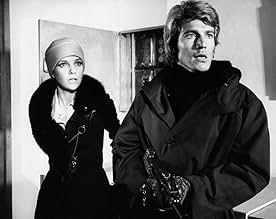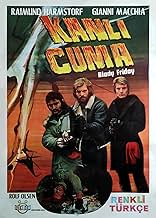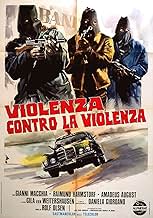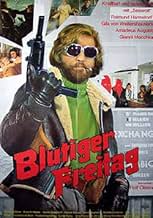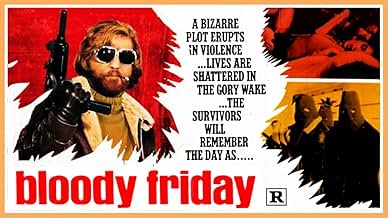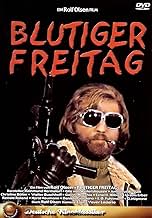NOTE IMDb
6,6/10
737
MA NOTE
Ajouter une intrigue dans votre langueWhen terrorists rob a bank all hell is let loose.When terrorists rob a bank all hell is let loose.When terrorists rob a bank all hell is let loose.
- Réalisation
- Scénario
- Casting principal
Totò Mignone
- Franz Muhl
- (as Ottone Mignone)
Claudius Casagrande
- Niki
- (non crédité)
Robert Furch
- Mann im Justizpalast
- (non crédité)
Karin Glier
- Nickys Mutter
- (non crédité)
Imo Heite
- Amerikanischer Soldat
- (non crédité)
Avis à la une
Excitingly shot against the undeniably picturesque backdrop of Bavaria, Germany, Rolf Olsen's schnapps-sharp 70s shoot 'em up, 'Blutiger Freitag (1972) (aka) 'Bloody Friday' is a bullet-shredded, blazingly brutal, Euro-crime classic! This bona fide, bloody-knuckled German icon of cult Grindhouse cinema benefits greatly from red-headed rapscallion, Raimund Harmstorf's super-masculine charisma, its appealing Munich exteriors, and suitably energized score. Olsen's grimy, full-throttle exploitation epic,'Blutiger Freitag' is certainly no less skull-rattling an experience than equally flint-edged poliziotteschi classics, 'Bloody Payroll', 'Violent Naples', 'Almost Human', and Michael Apted's vastly underappreciated Brit-crime masterpiece, 'The Squeeze'.
With its unleavened thuggery, exhilaratingly cavalier vehicular carnage, close quarters douchbaggery, and an unfiltered, genuinely terrifying performance from the muscular, enigmatic actor, Raimund Harmstorf; a force of corrupted nature, his bellicose, hugely misogynist misfit, Klett frequently indulges in bloody bouts of splenetic, bone-breaking violence; all the while cutting a darkly erotic dash in bespoke grungy, 1970s turtleneck sweater'd, leather-jacketed chic! 'Blutiger Freitag' is one of those rare 70s actioners that more than lives up to the fanboy hype, all its destructive Alpha energies resolutely undimmed! Throw in a sinuous crime-funk score from the estimable composer, Francesco 'New York Ripper' De Masi, and you have an all-time, Top Ten-list making, gun-happy Goliath of German grindhouse madness that deliriously delivers bravura, hard-boiled 70s skulduggery unlike any other German film from then, or now. Prost!!!!
With its unleavened thuggery, exhilaratingly cavalier vehicular carnage, close quarters douchbaggery, and an unfiltered, genuinely terrifying performance from the muscular, enigmatic actor, Raimund Harmstorf; a force of corrupted nature, his bellicose, hugely misogynist misfit, Klett frequently indulges in bloody bouts of splenetic, bone-breaking violence; all the while cutting a darkly erotic dash in bespoke grungy, 1970s turtleneck sweater'd, leather-jacketed chic! 'Blutiger Freitag' is one of those rare 70s actioners that more than lives up to the fanboy hype, all its destructive Alpha energies resolutely undimmed! Throw in a sinuous crime-funk score from the estimable composer, Francesco 'New York Ripper' De Masi, and you have an all-time, Top Ten-list making, gun-happy Goliath of German grindhouse madness that deliriously delivers bravura, hard-boiled 70s skulduggery unlike any other German film from then, or now. Prost!!!!
Womansing thug (Harmstorf) is sprung from the courthouse by two accomplices, then sets about planning the big heist of a local bank, equipped with a cache of high-powered weapons he's acquired from an American army outpost. Together with his faithful protégé (Macchia), who reluctantly on-boards his young girlfriend (Bohm) and her AWOL brother (August), the quartet bumble their way through the supposedly full-proof plan that aims to deliver them a cool million in cash and a new life in Australia. Predictably, things deteriorate quickly at every turn.
Harmstorf struts around in tight leather trousers, dropping C-bombs and picking fights he never wins with confidence and virility, an utterly repugnant and degenerate character. His internal adversary, the more even-tempered August character proves to be impotent to both the affections of one of the hostages, and to Harmstorf's increasing lunacy, remaining compliant in the hope of protecting his sister (Bohm) from harm. Generally the acting seemed pretty committed, although at times the atrocious dubbing makes it a mockery.
Paints a fairly miserable picture of working class Munich, often vulgar and violent, yet strangely engaging. The pitiful attempts by the gang to execute their plan, the constant set-backs, and Harmstorf's unbending belief that they'll all be free and filthy rich in spite of the escalating odds is worthy of the deepest sympathy. The climax was a bit disappointing but remained consistent with the overall tone, and while the jazz-pop soundtrack and dubbing will annoy some viewers, if you're not too picky, you might enjoy this quirky Bavarian bank robber flick.
Harmstorf struts around in tight leather trousers, dropping C-bombs and picking fights he never wins with confidence and virility, an utterly repugnant and degenerate character. His internal adversary, the more even-tempered August character proves to be impotent to both the affections of one of the hostages, and to Harmstorf's increasing lunacy, remaining compliant in the hope of protecting his sister (Bohm) from harm. Generally the acting seemed pretty committed, although at times the atrocious dubbing makes it a mockery.
Paints a fairly miserable picture of working class Munich, often vulgar and violent, yet strangely engaging. The pitiful attempts by the gang to execute their plan, the constant set-backs, and Harmstorf's unbending belief that they'll all be free and filthy rich in spite of the escalating odds is worthy of the deepest sympathy. The climax was a bit disappointing but remained consistent with the overall tone, and while the jazz-pop soundtrack and dubbing will annoy some viewers, if you're not too picky, you might enjoy this quirky Bavarian bank robber flick.
In this hard-boiled German-Italian production, Heinz Klett (Raimund Harmstorf), an anarchistic, mad-dog criminal, orchestrates a tricky escape from a Munich courthouse, right out from under the noses of police guards. With his gang -- Luigi (Gianni Macchia), Army deserter Christian (Amadeus August), and Christian's pregnant sister, Helen (Christine Böhm) -- Heinz next plans to rob the Deutsche Finanzbank so he can escape Germany and retire.
The heist is a bungled affair, as there isn't much money in the vault. But the robbers take ten hostages, including the heiress to a supermarket empire, and capitalize on the situation by demanding a million dollars in ransom and various modes of transportation out of the country. The police must contend with both the robbers and citizens who try to take over the investigation at every turn. In a marked contrast to how an American action film might depict a similar crisis, the cautious German constabulary readily accedes to all of Heinz's demands.
When Heinz and company receive the ransom money, they hijack a few of the hostages, including the heiress and a lesbian businesswoman who isn't impressed by Heinz's macho posturing. They get sidetracked to a country cabin, where the robbers' loyalties deteriorate. When a sympathetic Christian helps the heiress escape, she tips off the cops. Heinz rapes and murders the lesbian, while Luigi dies from an accidental gunshot wound. The cops surround the cabin and gun down Heinz, Christian, and Helen.
BLOODY FRIDAY is remarkable for not glamorizing its criminal protagonists, which was not the norm for crime movies of the late 60s and early 70s. It is only when the robbers are finally ambushed that director Rolf Olsen's staging makes a play for sympathy -- be they misguided youth or misunderstood human trash, did they deserve to die? Well, yes.
Olsen, who was more comfortable dabbling in lightweight sex films and mondo's, crams enough incident into the plot to keep our interest. The robbers' heist and subsequent flight from justice recalls every cliche in the book, but some scenes are remarkable -- the suspenseful escape from the courthouse; a toddler carrying a hand grenade outside the bank as if it were a toy; the massacre of the protagonists (equipped with extra large blood squibs); and a remarkably unpleasant rape scene, which is superimposed over slaughterhouse and, if you watch closely, hardcore sex footage.
Most of the cast underplays, which makes Harmstorf's intense performance as Heinz seem better than it is. However, his "Sea Wolf" is amusingly trashy, that of a cigar-chomping, machine gun wielding psychotic.
For those with a background in the social climate of 1972 Germany, one can discern the film's political subtext, with pointed references to Baader-Meinhof and the climate of social malaise that motivates the desperate thieves, as well as the ease with which they nab guns and start terrorizing the upper-class establishment.
The heist is a bungled affair, as there isn't much money in the vault. But the robbers take ten hostages, including the heiress to a supermarket empire, and capitalize on the situation by demanding a million dollars in ransom and various modes of transportation out of the country. The police must contend with both the robbers and citizens who try to take over the investigation at every turn. In a marked contrast to how an American action film might depict a similar crisis, the cautious German constabulary readily accedes to all of Heinz's demands.
When Heinz and company receive the ransom money, they hijack a few of the hostages, including the heiress and a lesbian businesswoman who isn't impressed by Heinz's macho posturing. They get sidetracked to a country cabin, where the robbers' loyalties deteriorate. When a sympathetic Christian helps the heiress escape, she tips off the cops. Heinz rapes and murders the lesbian, while Luigi dies from an accidental gunshot wound. The cops surround the cabin and gun down Heinz, Christian, and Helen.
BLOODY FRIDAY is remarkable for not glamorizing its criminal protagonists, which was not the norm for crime movies of the late 60s and early 70s. It is only when the robbers are finally ambushed that director Rolf Olsen's staging makes a play for sympathy -- be they misguided youth or misunderstood human trash, did they deserve to die? Well, yes.
Olsen, who was more comfortable dabbling in lightweight sex films and mondo's, crams enough incident into the plot to keep our interest. The robbers' heist and subsequent flight from justice recalls every cliche in the book, but some scenes are remarkable -- the suspenseful escape from the courthouse; a toddler carrying a hand grenade outside the bank as if it were a toy; the massacre of the protagonists (equipped with extra large blood squibs); and a remarkably unpleasant rape scene, which is superimposed over slaughterhouse and, if you watch closely, hardcore sex footage.
Most of the cast underplays, which makes Harmstorf's intense performance as Heinz seem better than it is. However, his "Sea Wolf" is amusingly trashy, that of a cigar-chomping, machine gun wielding psychotic.
For those with a background in the social climate of 1972 Germany, one can discern the film's political subtext, with pointed references to Baader-Meinhof and the climate of social malaise that motivates the desperate thieves, as well as the ease with which they nab guns and start terrorizing the upper-class establishment.
This is just a great, over the top story of a bank heist gone wrong with the greatest bad boy of movie history, Raimund Harmstorf. Chock full with (visual) violence, cheap FX and really the greatest trash talk of all times. And Gila von Weitershausen as the naive bit on the side isn't too bad either.
"Whatever they can do in Italy, we can do better" they must have thought in Germany. Extremely violent crime thrillers were very popular in Italy during the early 70's and at least a dozen of awesome ones got released every year. "Bloody Friday" is more or less Germany's response to this successful trend and a damn perplexing one, I may add! When the heavy criminal Heinz Klett escapes police custody during his transport to court, he promptly executes his plans to commit the biggest bank robbery ever in the history of the country. He, his regular partner and his girlfriend's brother storm into the bank heavily armed and take 10 people hostage. While the police attempts to gather the $1.000.000 ransom, and entire media circus unfolds outside on the streets. You usually know pretty much exactly how this kind of movie develops. Things don't go according to plan, there's the Stockholm Syndrome and a couple of unplanned deaths along the way. Apparently the film is inspired by similar real-life events as they occurred in Germany. I don't know which parts of the film were fictionalized, but I seriously wonder if the real events ended in such a nauseating and shocking bloodbath as well. I hope not. Probably the greatest accomplishment here is the biting social satire. While the hostage is going on inside, the public outside shouts for the re-implementation of the death penalty and there are even are some sly businessmen that unscrupulously want to make money out of the gathered crowd. It's certainly also not a film for people with an easily upset stomach or tangled nerves. Heinz' escape is bloody already and there's massively shocking sequence involving a hand grenade at the beginning of the hold-up. "Bloody Friday" is well-directed (by the guy who did "Shocking Asia"), the acting performances are pretty great and everything else (music, editing, photography, atmosphere) is simply in-your-face brutal and confronting.
Le saviez-vous
- AnecdotesIn 2015, Subkultur Entertainment started a crowdfunding campaign via Kickstarter to restore the film which was successful. During the restoration it was discovered that the soundtrack was longer than the film itself. This resulted in raiding the vaults at the production company Lisa Film. There, a film reel was discovered which contained scenes cut to obtain a rating from the FSK. In the end, the original director's cut was restored in 4K resolution.
- Versions alternativesGerman theatrical version was cut to secure a "Not under 18" rating. Only in 2017 the uncut version was released on DVD/Blu-ray.
Meilleurs choix
Connectez-vous pour évaluer et suivre la liste de favoris afin de recevoir des recommandations personnalisées
Détails
- Durée
- 1h 34min(94 min)
- Rapport de forme
- 1.66 : 1
Contribuer à cette page
Suggérer une modification ou ajouter du contenu manquant

